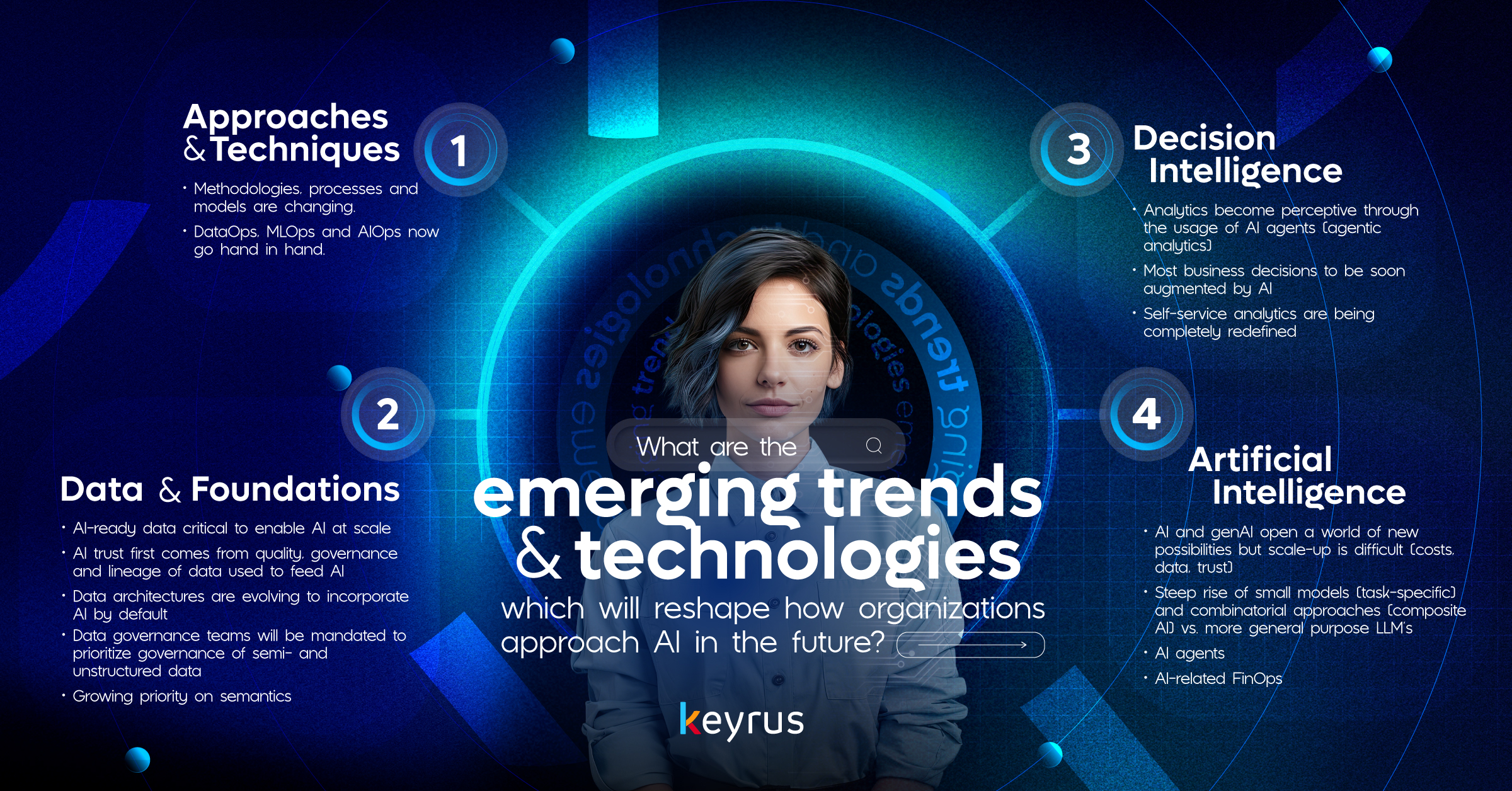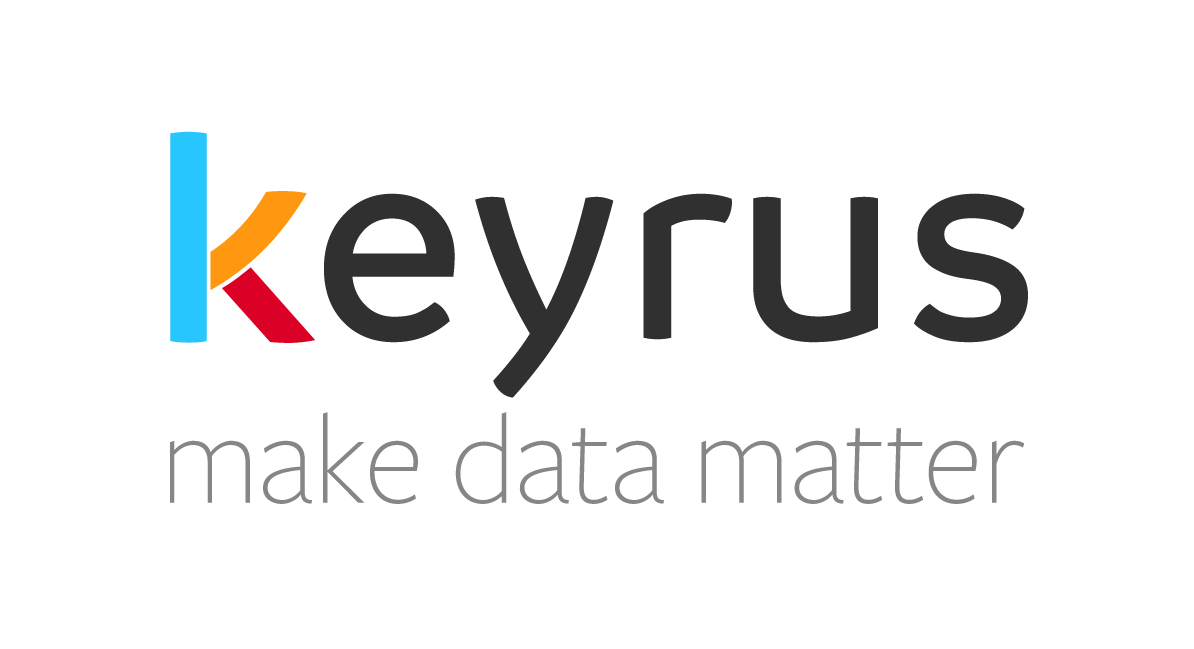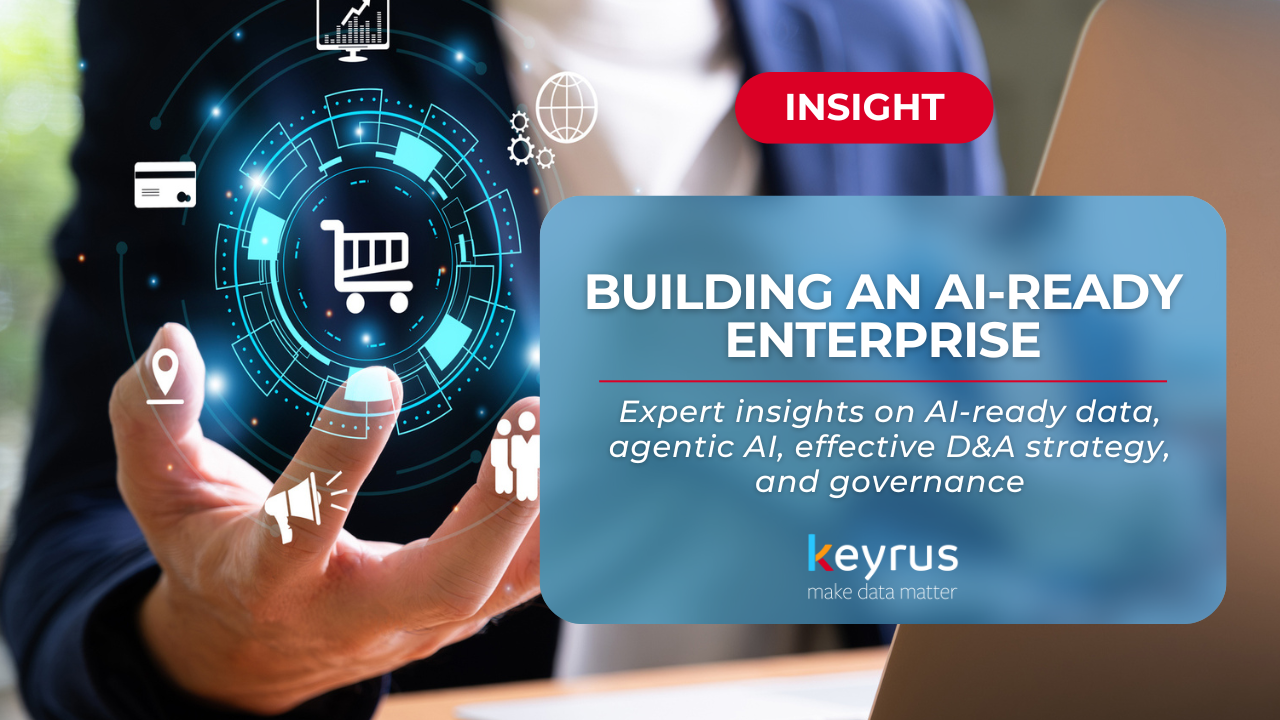As Artificial Intelligence reshapes industries, many enterprises find themselves at a critical crossroads: how to move from AI experimentation to scalable and impactful transformation. The road is challenging, with common pitfalls tied to data readiness, FinOps, governance, and deployment.
In this article, we explore foundational components of successful AI adoption and scale-up, drawn from practical experience in advising enterprises on data, analytics, and AI integration.
Innovation and the future of AI
What are the emerging trends & technologies which will reshape how organisation approach AI in the future?

Approaches & Techniques:
Methodologies, processes and models are changing.
DataOps, MLOps and AIOps now go hand in hand
Data & AI Foundations:
AI-ready data are critical to enable AI at scale.
AI trust first comes from quality, governance and lineage of data used to feed AI.
Data architectures are evolving to incorporate AI by default.
Data governance teams will be mandated to prioritize governance of semi- and unstructured data.
Growing priority on semantics.
Decision Intelligence:
Analytics become perceptive through the usage of AI agents (agentic analytics)
Most business decisions to be soon augmented by AI
Self-service analytics are being completely redefined
Artificial Intelligence:
AI and genAI open a world of new possibilities but scale-up is difficult (costs, data, trust)
Steep rise of small models (task-specific) and combinatorial approaches (composite AI) vs. more general purpose LLM’s
AI agents:
AI-related FinOps are now emerging
What it means to be truly AI-ready

AI readiness is much more than implementing algorithms—it’s about understanding the critical role of data, people, and processes to enable AI-driven strategic differentiation. In other words, it is about understanding the tight bounds between:
AI and data: data feeds AI, AI feeds data. According to Gartner (2025), by 2027, organisations that prioritise semantics in AI ready data will increase their GenAI model accuracy by up to 80% and reduce costs by 60%
People and competences: data and AI literacy are essential for successfully adopting a data-driven culture and effectively deploying an AI strategy
Data and model governance: ensures your data assets are aligned with business goals, ethically sourced, and cost-effective.
True AI maturity means embedding AI into your core organisational functions of the C-suite to deliver long-term competitive advantage, leveraging multiple techniques and approaches (generative AI, machine learning, advanced analytics, agents approaches) to make a difference.
Why AI-ready data matters
Simply said, without data, there is no AI. Indeed, despite tremendous advances in algorithms, the true strategic differentiator for companies to be competitive is in their data - not in the shared algorithms used by all. So how can companies remain competitive if we all use the same AI approaches? Simply implementing AI anywhere is not the answer. Certainly it can help accelerate and automate certain business tasks, but the true value lies in applying AI techniques to a company’s own data. Data is now more important than ever before in the AI era.
AI-ready data combines traditional data management with AI-specific practices and requirements. Practical tools and frameworks such as data catalouging, lineage tracking, synthetic data generation are necessary to improve the AI maturity of your data. The latter often missing for organisations to be able to begin their AI transformation journey.
It is therefore not surprising that most companies fail after the pilot stage because their data is not AI-ready. Real AI readiness involves identifying, filtering, and preparing only the most relevant datasets—not simply feeding everything into a model. This shift is fundamental. Traditional business intelligence (BI) tools relied on structured data. In the AI era, enterprises must process and govern multi-structured data: text, images, audio, video, and documents to leverage AI to its full potential.
Not only that, but other common AI deployment challenges include:
Cost: AI projects can quickly become too costly when trying to be scaled. Often leading to the abandonment of many AI projects after the initial phase
AI and data literacy: Lack of understanding & a data-driven culture within organisations, notably in C-level.
Data quality & data silos: data to feed the AI isn't trustable nor always accurate, & dispersed across multiple data sources, all built in mind for their own individual objective and not towards the global objectives of the company.
Agentic analytics and data-driven decisions
What is Agentic Analytics?
Agentic analytics refers to analytics powered by autonomous AI agents capable of interpreting data and generating context.
While traditional analytics focus on “what happened,” agentic analytics brings in contextual understanding—a missing piece in current BI platforms.
With the rise of this now contextual layer, it allows us to move into the era of perceptive analytics. With the fact that these AI agents can now compare multiple contextual scenarios, the models can offer more informed decisions, assisting executive deciders even further in making the best decisions for their company.

What does this mean for CDOs?
For a CDO, agentic AI will impact their operating models in multiple ways:
Operating Model Modernisation
Embeds autonomous agents into your data lifecycle: ingestion, quality checks, cataloguing, lineage, metadata enrichment.
Reduces manual overhead in data stewardship, freeing talent to focus on high-value governance and innovation tasks.
Enables dynamic data products in a data mesh or federated architecture by automating monitoring, contract enforcement, and SLA management.
CapEx vs. OpEx Management
CapEx optimisation
Instead of heavy upfront investment in bespoke automation or rigid platforms, agentic AI allows you to use modular, adaptive agents that scale with business demand. This means lower fixed infrastructure and development costs.
OpEx optimisation
Agents can continuously optimise cloud spend (e.g., auto-tuning queries in data platform, monitoring pipeline costs in data orchestration tools, optimizing report/dashboard refresh schedules) — effectively acting as "financial co-pilots" for your data estate.
Summary: As a CDO, agentic AI gives you a lever to scale your operating model without proportionally scaling your cost base. It helps you manage CapEx (by reducing the need for upfront investments in monolithic automation) and OpEx (by automating ongoing monitoring and optimisation). All of this is achieved without weakening your security posture, because the agents themselves can be embedded into your governance framework, acting as continuous compliance enforcers.
The strategic role of data & AI governance
Why governance is non-negotiable
Data and AI governance ensures your data assets are aligned with business goals, ethically sourced, and cost-effective. It acts as the bridge between innovation and risk mitigation. As AI initiatives scale, governance becomes the backbone of responsible deployment.
Key governance imperatives:
Validate data relevance and readiness
Align data policies with business objectives
Keep data quality in check to mitigate risks of unreliable AI outcomes
At Keyrus, we recommend building adaptive governance models that support both control and agility using frameworks like DataOps or Responsible AI. Looking for data expert to help with this? Contact us for a data & AI consultation.
Defining a robust data & AI strategy
A forward-looking data and AI strategy must go beyond technology choices. True AI integration doesn’t stop at simply deploying one model. It means building a combinatorial approach to AI, to create a true competitive advantage. One that is unique to your organisation, your needs and your data. It should include:
Vision and Alignment:
What is the future goal and does it align with the diverse objectives of the rest of the business functions?
Value and Drivers:
How will you measure the value of an AI initiative and if its feasible for quick & scalable adoption?
Adoption & Risk:
How can I transform my data & analytics strategy so that even non-technical users can be operational users? What are the risks and how will they be mitigated?
As of today, CDAOs are rising in leadership roles however 49% of leaders highly involved in AI report that their organisations struggle to estimate & demonstrate the value of AI – Gartner 2025. This challenge often due to lack of AI literacy within a company, or lack of a data-driven culture.
This is where Keyrus can help: accompanying our clients to invest wisely in AI by:
Assessing their current data maturity & AI readiness.
Building a priority roadmap for an effective AI transformation journey.
Providing our data & AI expertise to implement the roadmap, give guidance on the correct architecture and technology investments, as well as defining the right frameworks required for successful deployment.
Improving your internal data-driven culture & AI literacy through training.
One piece of advice for AI beginners
Start by making your data ready: AI-ready. Without clean, structured, and governed data, AI projects will fail to scale or provide value.
Your mindset should be:
Strategic, not tactical
Long-term, not opportunistic
Data-first, not model-first
Final thoughts
The future of enterprise AI lies not in isolated use cases or flashy demos but in systemic, data-driven transformation backed by governance, strategy, and cross-functional collaboration.
At Keyrus, we guide organisations through every stage of AI and data maturity—from defining a clear vision to delivering operational value.
Are you ready to make your data matter? Contact us

